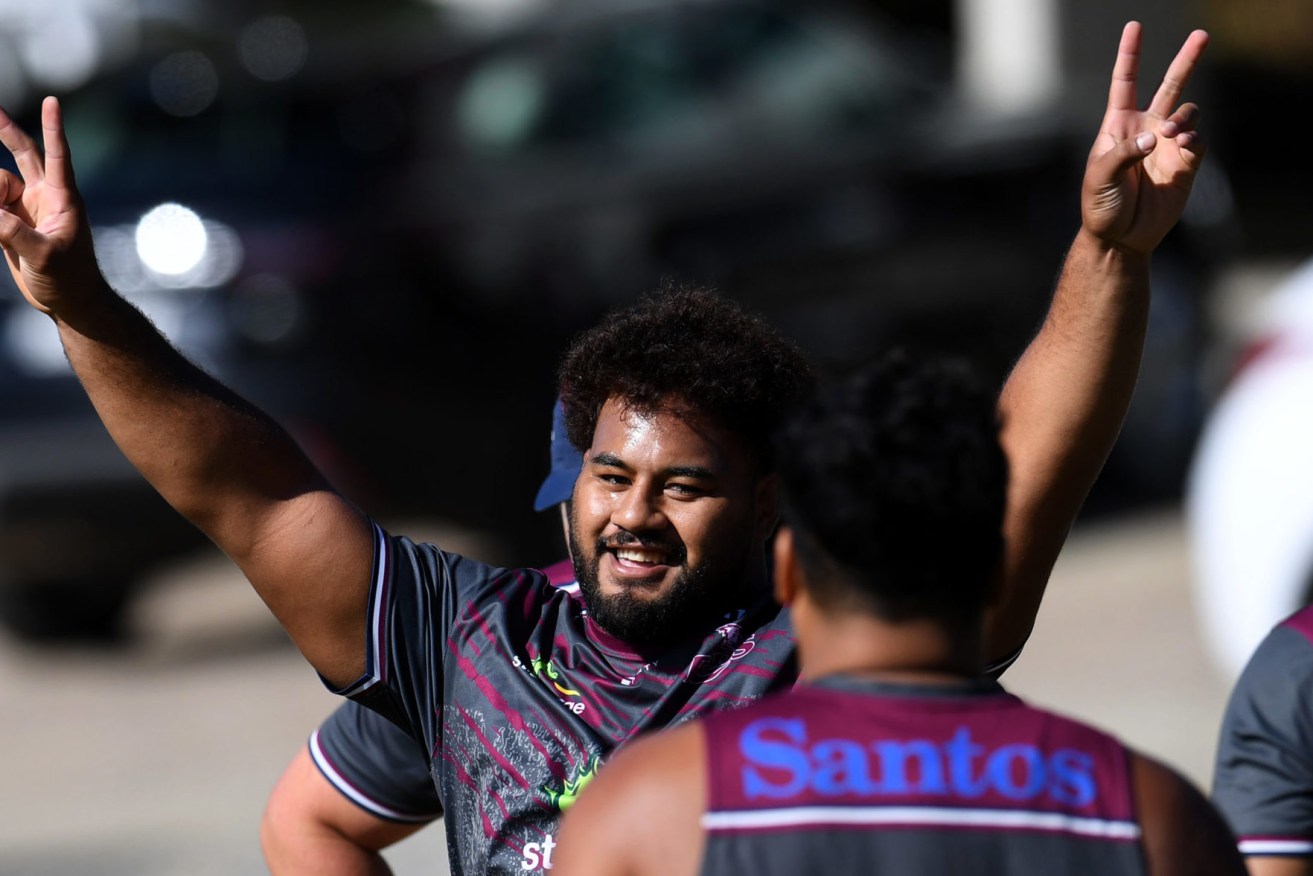The art of separating the dollars from the sense, and leaving others to see Red
Three young Queensland Reds rugby stars this week broke an unwritten code by rejecting a pay cut that has been accepted by their teammates. But do they fully understand the price of that decision, asks Michael Blucher


Senior Queensland Reds players such as Taniela Tupou, seen at training this week, have accepted a COVID-related pay cut to get the game back under way - but three young stars have broken ranks. (Photo: AAP Image/Dan Peled)
A few years ago, a couple of Queensland Reds players were asked by the sports master of one of Brisbane’s leading private schools if they’d spend the afternoon helping out with the underage rugby program.
They had no hesitation in accepting the invitation. They were outgoing types, good blokes, who also understood the benefit of building their profile. Do the hard yards, make as many deposits as you can in the “favour bank” and who knows where it might lead? Pretty good thinking for mine.
However, before the players “appeared” at the school the sports master received a call from their manager.
“Who do you want me to make the invoice out to,” he asked, with a stiff commercial upper lip.
What? What invoice?
“For the boys’ appearance. They’re not doing it for nothing, you know. You’ve gotta understand – they’re professionals,” the manager explained unapologetically.
The teacher was completely taken aback. There was never any discussion about money. And no budget. Reluctantly, he cancelled “the public appearance”.
The disturbing aspect of the story – the players didn’t even know they were being “charged out”. They were happy to do it FOC. In their eyes, it was all part of their job as professional players. A very important part – promoting the game in one of rugby’s most prolific nurseries.
And yet here they were, being presented as the villains, on account of the actions – the greed – of their manager, the very person who was meant to be representing their “best interests”.
No “appearance fee” for the players, no commission for the manager. Simple as that.
There are some very accomplished managers working ethically and tirelessly behind the scenes in Australian sport. Equally, there are hundreds if not thousands of examples of athletes being misrepresented, and having their reputations tarnished through the short term thinking of the people supposedly acting in their “best commercial interests”.
One of my favourites – the Australian cricketer who on account of the game’s association with Australia Post, was invited to have his image used on a stamp.
His manager declined – not enough money, apparently. Never mind the profile. The Australian public would have been licking the back of the cricket star’s head for six months or more. The exposure would have been invaluable.
Another example – the Olympian who was paid $5000 to speak at a dinner. Did a wonderful job. The corporate client was delighted – until they received the final invoice. It included $25 for “petrol money”, a little levy, furtively added by the management company, without the athlete’s knowledge.
In the aftermath of the event, all the client could talk about was the $25 sting for petrol. “You’re telling me they can’t get themselves there to earn five grand in two hours – seriously? ” Again, an agent was prepared to throw their client under the bus, all for sake of 25 measly dollars.
It’s against this backdrop that we explore the case of the three Queensland Reds players who this week refused to sign a pay cut deal for the 2020 season, effectively exiling themselves from their employer, if not Australian Rugby altogether.
All three are represented by the same manager, a hard-nosed commercial operative, who shapes careers but at the same time, is completely anonymous. If his head popped out of a scrum in the middle of a Bledisloe Cup test, not one fan would have the faintest idea who he was. He’s works in the shadows.
Now did the manager in question force the trio into their tone-deaf decision to abdicate, at a time when the game in Australia needed them most?
I wouldn’t have thought so.
As 20 something year-olds, they are adults, and have to own their decisions. That said, their manager’s strained relationship with local rugby officials is well established, and underscored by a heated exchange in the QRU Boardroom last year, where and when he mapped out his vision for the code in Queensland. It wasn’t particularly pretty.
That aside, does he have the right, as their manager, to recommend where they play, and for how long, and for whom? Of course he does.
But it should also be pointed out that the commission arrangement for managers working with overseas rugby clubs is very different to the model in Australia. In Japan for instance, the commission is paid upfront – by the club. In Australia, the managers receive regular installments – from the players. Three new overseas deals versus rolling commission on three heavily reduced existing contracts…do the sums.
What most apalls local supporters about the trio’s lone stand is their brazen self-interest, at the expense of their teammates and more broadly, the game in Australia.
One apparently couldn’t get on with the coach (a convenient dynamic at a time like this), one apparently wasn’t happy with the opportunity he was being given (I hasten to add, in his first full year of professional football), and the third – God only knows what’s going on there. A chance to skip to the front of the Japanese club queue, before the exodus from the code in Australia begins? Nice.
Whatever happened to the boys stickin’ together, diggin’ in, stayin’ tight?
Outside of “taking it one game at a time” and “coming away with the two points”, it’s all we ever hear about in post-match interviews. “Doing it for the boys, working hard for one another, trustin’ the bloke beside you.”
Until, it seems, my manager comes up with something that might suit me – and him – better.
As an extension of that, do these young guys really think they’re not going to encounter similar challenges at their next club? With their next coach?
Has anybody ever explained to them that having the shits with the people you work with is pretty damn normal? Even inevitable? Ask a partner at any law firm, or a sales rep at a spring factory. Or the girl behind the counter at your local supermarket.
You don’t always get on, and you definitely don’t always get what you want.
And those people above you – your bosses – sometimes you’ve just got to do what they want you to do, whether you like it or not. It’s called the real world.
One former Wallaby I spoke to played professional rugby for 13 seasons and he estimated he didn’t get on with 60 per cent of his coaches.
But as he regularly reminded himself, he didn’t play rugby to make friends with coaches – he played because he loved the game. In other words – suck it up, Sunshine.
It should be pointed out, young professional athletes are not exactly renowned for their decision making prowess. One, because they’re just that – young. And two, because from a very early age, most decisions are made for them. Where to be, what to wear, what to eat, how hard to train, for how long – it’s a very set and structured environment in which they live.
Typically, they also shy away from uncomfortable conversations and struggle to put a price on their own head.
This helps explain why most rely so heavily on their manager to fight their fights, and negotiate the biggest deal available.
What’s rarely recognised by sports managers is that the biggest deal and the best deal are not always the same thing.
One might build wealth, but the other builds brand. And reputation. And it’s pretty clear what’s more likely to sustain somebody, once the boots are tossed into the cupboard for the last time.
With that – Sayonara boys. Sorry to see you go.
But we look forward to getting acquainted with your replacements.
The dogs may bark, but the caravan rolls on.












